After Carrie Jones had her first child, it was nine years until she had another successful pregnancy. She never imagined she would give birth to quintuplets – thanks to the determined prayers of her eldest
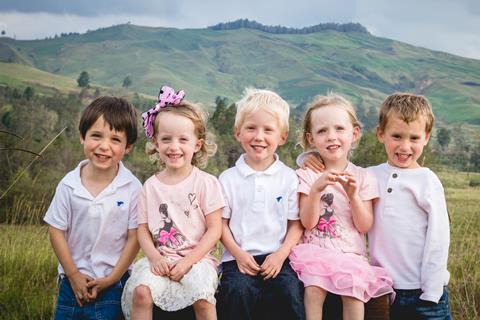
Carrie and her husband, Gavin, met when they were just six years old, as their parents worked with Wycliffe Bible Translators in Colombia. But it wasn’t until years later that they reunited and fell in love while at university.
Gavin was training to be a missionary pilot, and Carrie an epidemiologist. They married in 1999, and their son Isaac was born in 2004. Eighteen months later they moved to Papua New Guinea with Wycliffe Bible Translators.
Complications, heartache…and heartfelt prayers
“We wanted three kids and when Isaac was three and a half, we got pregnant again. However I suffered an ectopic rupture. Because we were out in the middle of nowhere when it happened, I nearly died. It created quite a lot of damage internally so I had to have surgery. I later had a miscarriage and was told I had a chronically thin uterine lining.”
Carrie, Gavin and Isaac moved back to the USA in order to access fertility treatment.
“I knew that I was going to need extra help to keep a baby, so they put me on a hormone that caused me to have a thicker lining, but it also caused me to ovulate a lot of extra eggs. That was on the side that no longer had a fallopian tube because of the rupture, so the doctor said: ‘We don’t need to worry about those eggs, because there’s no tube there anyway.’ But they hadn’t counted on the fact that, about 30 per cent of the time, the eggs float and are drawn to the other side by suction.”
In the many years of waiting for a second pregnancy, Isaac had been praying for a sibling. “He just was so desperate to have a little brother or sister. So for five years, he would pray every night: ‘Dear God, please give mummy a baby in her tummy.’ It was heartbreaking.
“At some point, my own prayer just became ‘please’. I had run out of words to communicate my pain and my desire. The thing that made it hardest was the fact that Isaac wanted it so badly. I was at the point where I thought we just need to give up, but he wasn’t willing to. We began what was going to be our last cycle of intrauterine insemination, which involves putting the dad’s sperm directly into the uterus.”
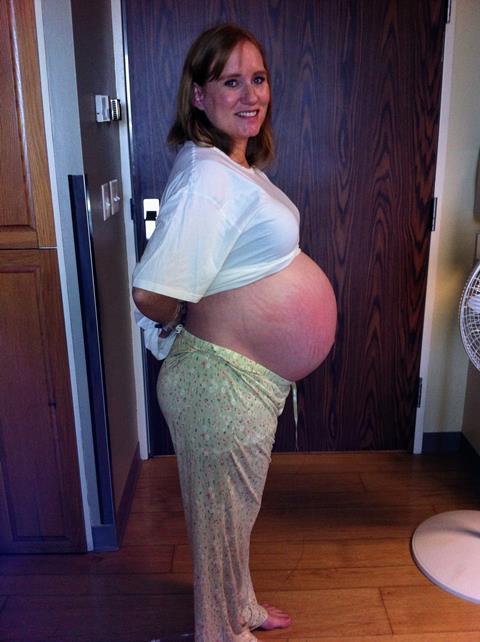
Coming to terms with reality
Carrie had an early ultrasound when they realised she was pregnant. The doctors were concerned after her previous rupture, and wanted to make sure the fertilised egg was where it should be.
“At the six-week ultrasound my womb looked like a honeycomb. Inside each honeycomb was a little bean, and each bean had a little heartbeat. The technician said: ‘Are you expecting multiples?’ Gavin asked: ‘Should we be?’ I was thinking: ‘I can’t do triplets.’ And then she said: ‘There’s number five!’
“At that point Gavin says our brains broke and we just burst out laughing.”
That night Carrie started having panic attacks. “I couldn’t sleep, as I was worrying how we were going to take care of five babies. The doctors right away said we needed to selectively reduce, as there’s no way I was going to be able to carry all of them. The medical staff presented it as though there was no option.
“I asked: ‘Well, what does that mean?’ They described injecting saline into the little fertilised embryos and aborting them. I told them: ‘If the Lord wants us to have these babies, he’ll give us these babies. If he wants some of them to have issues, they’re going to have issues. If I’m going to die, that’s OK. My life is in his hands. We’re not ending these lives.”
Carrie and Gavin went to a maternal foetal specialist, who said he would do everything he could to keep the babies inside Carrie as long as possible.
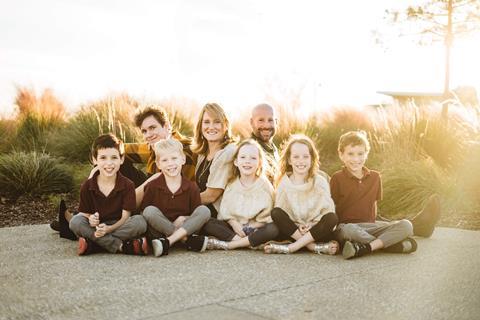
Adjusting to life
Carrie was able to carry the quintuplets for 27 weeks and five days (the average is 28 weeks). “I was hoping to go at least two more weeks but Will broke my water. He was baby A so he was right down at the cervix. He had some meconium staining in his amniotic fluid so he was ready to get out of there. However Seth and Gracie were not so it was hard on them because they were the two smallest.”
Carrie had a C-section and the doctor delivered the babies less than one minute apart. David was in the neonatal intensive care unit for two and a half months, Marcie for just over three months, followed very quickly by Gracie and Will. Seth had to be in for a full five and a half months and went home still needing lots of medications and machines. He had severe bronchopulmonary dysplasia, which is scarring of the lungs, and chronic lung disease. The machines that were keeping him alive were also damaging his lungs because he required so much pressure and so much oxygen. But now at ten years old he’s absolutely perfect. He’s been totally healed.”
I was at the point where I thought we just need to give up, but [my son] Isaac wasn’t willing to
After the quintuplets arrived home from hospital Carrie held onto God to get her through. “I think the most significant promise was from Matthew 11:28–30: ‘Come to me, all you who are weary and burdened, and I will give you rest. Take my yoke upon me and learn from me, for I am gentle and humble in heart…For my yoke is easy, and my burden is light.’
“I felt so burdened, physically, emotionally and mentally. I had had severe postpartum depression with Isaac and knew it was a big risk again. We needed to be sure that I was OK before we went back to the mission field. Those verses were just such a precious promise that it was his yoke. I had not wanted this; the doctors hadn’t wanted this. This was something he did, and he wasn’t going to leave me.
“In some ways, it was easier than having twins because when you have five, you get so much more help. We never even had to get up with them at night for the first seven months. We always had volunteers from our Christian community at night. We never had to buy a single nappy, outfit or formula. The Lord just overwhelmed us with his goodness.
Returning to Papua New Guinea
Will, Grace, Marcie, Seth and David were 22 months when the family returned to Papua New Guinea. For Carrie, the transition was brutal. “It was probably the hardest time of my life, because Seth wasn’t handling the germs or the altitude in Papua New Guinea well, and the mission doctor said he was going to have to send us back to the USA. The thought of getting back on a plane with five 22-month-old children was just horrific. We all got cryptosporidium – so everybody had rampant diarrhoea.
“Seth and Gracie were both on oxygen and we got to the point where we were running out. We had to send a friend down to fetch more oxygen from a coast city near.
“The Lord was so gracious to remind me of his precious promises. At a time when I couldn’t really be studying the Bible, I was just putting one foot in front of the other and crying and trying to keep my babies alive and not to be sent home.
In some ways, it was easier than having twins because when you have five, you get so much more help
“We have had so many hundreds of people praying for us, so many people who have followed the story and love these kids. They are so popular with the Papua New Guineans, and have been a real bridge to the people.
“Gavin flies for evangelical missions in Papua New Guinea to deliver medical aid. In every community he flies to, he talks about our kids and the entire airstrip or village immediately gathers around him to see pictures on the iPad. He starts by talking about the children then tells them the gospel.
“What blesses me so much is remembering Isaac’s face when we told him he was going to be a big brother. He got five siblings – one for every year he prayed. When we told him he said: ‘That’s what I’ve always wanted!’”
To read more about Carrie and her family visit: gavincarrie.blogspot.com




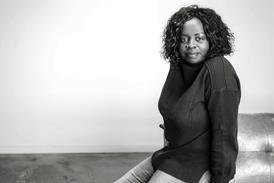
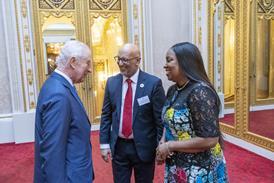


























No comments yet